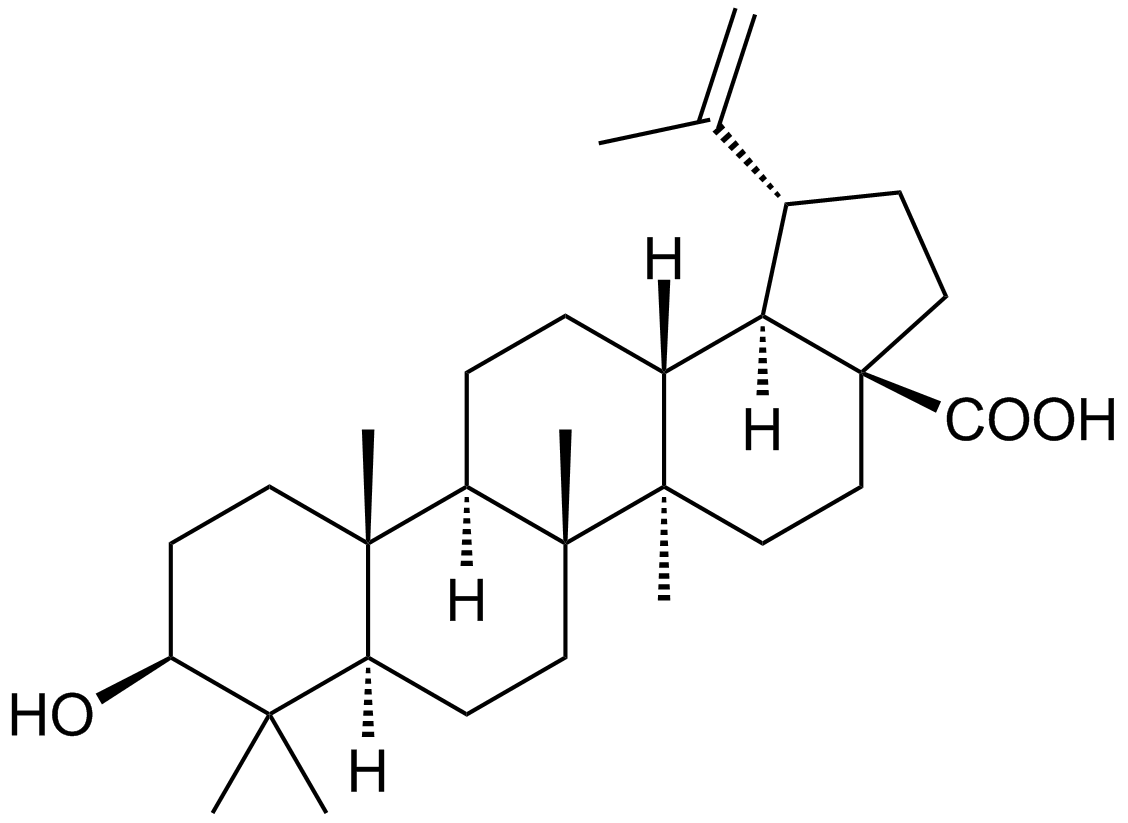Betulinic acid (Synonyms: Lupatic Acid, NSC 113090) |
| Catalog No.GC10480 |
A plant triterpenoid similar to bile acids
Products are for research use only. Not for human use. We do not sell to patients.

Cas No.: 472-15-1
Sample solution is provided at 25 µL, 10mM.
Betulinic acid is a natural pentacyclic triterpenoid, acts as a eukaryotic topoisomerase I inhibitor, with an IC50 of 5 μM, and possesses anti-HIV, anti-malarial, anti-inflammatory and anti-tumor properties.
Betulinic acid is a eukaryotic topoisomerase I inhibitor, with an IC50 of 5 μM, and prevents topoisomerase I-DNA interaction[1]. Betulinic acid (10, 20, 40, 80, and 160 µM) significantly suppresses MDA-MB-231 cell viability in a time- and dose-dependent manner after treatment for 24 or 48 h. Betulinic acid (20, 40 µM) causes decrease in Bcl-2 expression of MDA-MB-231 cells. Betulinic acid also induces morphological changes of MDA-MB-231 cells at 20 µM, and leads to ultrastructure changes of MDA-MB-231 cells at 40 µM[2]. Betulinic acid shows anti-HIV activities, with an EC50 of 1.4 µM in acutely infected H9 lymphocytes[4].
Betulinic acid (10 and 30 mg/kg, p.o.) significantly abrogates colon shortening, and reduces malondialdehyde (MDA) and lipid hydroperoxide levels in dextran sulfate sodium (DSS)-induced colitis in mice. Betulinic acid (30 mg/kg, p.o.) restores superoxide dismutase (SOD), catalase activity and glutathione (GSH) content to control levels in DSS-induced colitis in mice. Betulinic acid (30 mg/kg, p.o.) also inhibits the DSS-induced increase in inflammatory markers. Betulinic acid (3, 10, 30 mg/kg, p.o.) suppresses acetic acid-induced writhing responses and mustard oil (MO)-induced visceral nociception in mice[3].
Reference:
[1]. Chowdhury AR, et al. Betulinic acid, a potent inhibitor of eukaryotic topoisomerase I: identification of the inhibitory step, the major functional group responsible and development of more potent derivatives. Med Sci Monit. 2002 Jul;8(7):BR254-65.
[2]. Gao Y, et al. Betulinic acid induces apoptosis and ultrastructural changes in MDA-MB-231 breast cancer cells. Ultrastruct Pathol. 2018 Jan-Feb;42(1):49-54.
[3]. Kalra J, et al. Betulinic acid alleviates dextran sulfate sodium-induced colitis and visceral pain in mice. Naunyn Schmiedebergs Arch Pharmacol. 2017 Dec 26.
[4]. Hashimoto F, et al. Anti-AIDS agents--XXVII. Synthesis and anti-HIV activity of betulinic acid and dihydrobetulinic acid derivatives. Bioorg Med Chem. 1997 Dec;5(12):2133-43.
Average Rating: 5 (Based on Reviews and 30 reference(s) in Google Scholar.)
GLPBIO products are for RESEARCH USE ONLY. Please make sure your review or question is research based.
Required fields are marked with *




















